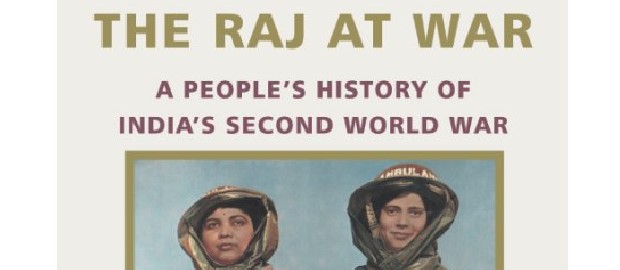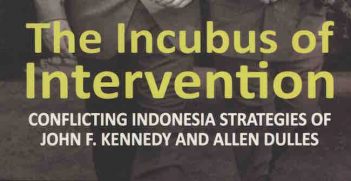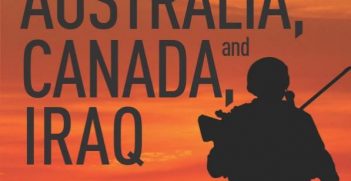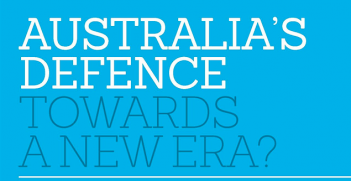The Raj at War: A People’s History of India’s Second World War

Yasmin Khan is a British historian at Oxford University. She has a distinguished reputation as the author of several books on the sub-continent. Her book has been positively received including William Dalrymple’s supportive profile in the Weekend Australian. As the title infers, it is a social history of the impact of the Second World War on the then subjugated people of India with the war unleashing the competing forces of nationalism, religion and political and civil struggles for independence.
While it is currently hard to find in Australia, as a boutique work vectored to a narrow field of South-Asian studies it is worth seeking out; many libraries should stock it. The book explains much about the sub-continent and its struggle for human rights and self-determination.
India ceased being a dominion in mid-August 1947 when it achieved nationhood as a republic, with the Raj ceding power and granting Indians the self-development they had long fought for. It was a bifurcated state as Pakistan also emerged, truncated from India, both becoming casualties of a precipitous decision made in London. Democracy came with a stop watch. For Whitehall, it was all too hard, for Britain had to shed a colony even when it may not have been fully ready to assume the responsibilities, but then the British could hardly be blamed for the calamitous bloodshed which soon followed on their sudden exit. India and Pakistan both lost control of their history – which is an unintended result of geography by treaty. Once again, it was an example that arbitrary borders created by Imperial powers can create more problems than solutions. Separating people by political decisions only exacerbates the dilemma. Soon, people would be carving each other up, as no euphemism could down-play the tortured events which followed: atrocities, massacres, genocide and pogroms all morphed as one. Adding ethnicity, religion, culture, language, history, caste and social mores to the mix makes for a heady brew. A cliché can describe it, for both had a violent birth. Both nations have had an ambiguous relationship with their former imperial power but have moved beyond their shared history.
The Second World War bought wartime militarisation of an avowedly warrior caste. Indian ranks were filled by volunteers as conscription was a contentious issue for many emerging, if long-suffering, nationalist leaders. Dr Khan has been a beneficiary of Alan Jeffreys’ and Patrick Rose’s path-breaking work The Indian Army, 1939-47: Experience and Development. Troops from India and Pakistan, and from other lands within, fought bravely in the Second World War as in other wars. Kaushik Roy said as much about his forbears: “The very fact that the two sovereign dominions, India and Pakistan, acquired disciplined standing armies shows the high mettle and man management skill of the Indian Army’s officers and the hard professionalism of its personnel” (Military History, volume 77, number 1, pp. 369-370, January 2013).
Consider the role of the Indian army, in all its derivations, as it fought courageously against the Japanese during the Burma campaign: “The Gurkhas were as much a part of the Indian army as the Sikhs, the Marathas, the Rajputs, the Pathans, the Baluchis and other men from all over India” (Anil Chandra, Indian Army triumphant in Burma, 1984). In social theory, this was also a mobilisation of the elites, as many officers and men would play a key role in civilian life forging a new status in the aftermath of the war and on national self-realisation itself.
If there is any doubt about the contribution of Indian troops in the Second World War, rest assured Britain could not have done without them, as they were also architects of their own victory. They fought well in Africa, Italy and the Far East, and wherever they were deployed. What were the indices of their courage? One source, J.M.A. Tamplin, noted 30 awards of the Victoria Cross to the Indian army during the Second World War.
Yet despite that heroism, some Indians suffered insults inflicted by erstwhile fellow British allies. In a 1946 diplomatic despatch, the Australian High Commissioner referred to social prejudices: there occurred some cases in which Indian members of the forces passing through South Africa were humiliated to the extent that even Indian officers of the Air Force were refused service in a hotel. Verily, this was unconscionable and morally reprehensible as Indian service personnel were, by extension, defending South Africa. Thankfully, apartheid attitudes succumbed to the force and weight of global indignation when South Africa finally emerged into the civilised world. Those Indian Air Force officers might have wondered whether South Africa was worth its freedom.
Yasmin Khan has written a fine book.
Yasmin Khan, The Raj at War: A People’s History of India’s Second World War, Bodley Head, London, 2015.
Mike Fogarty is a former officer with the Department of Foreign Affairs and Trade who served in Singapore and Hanoi.





